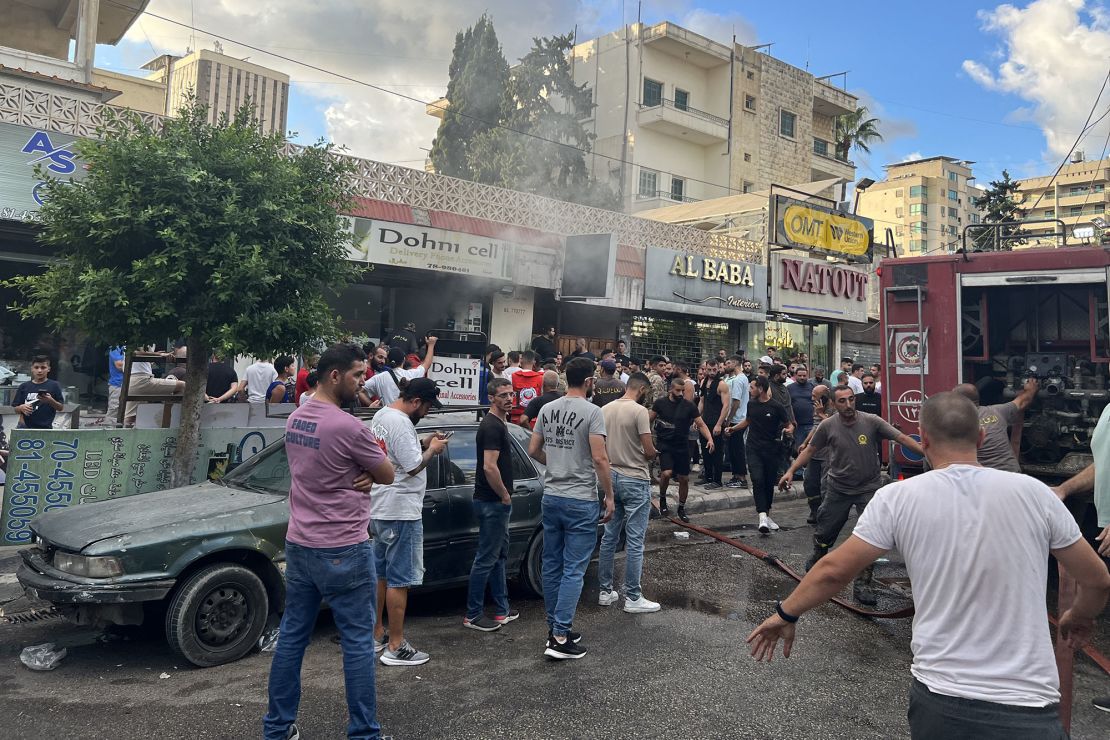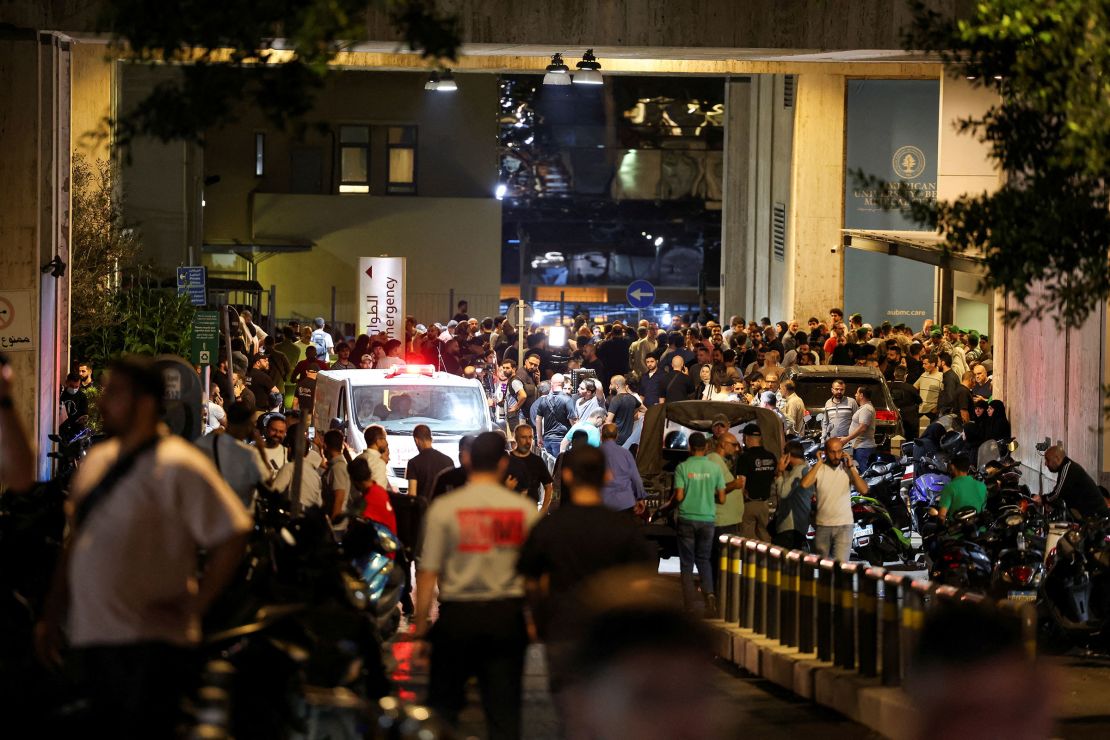What happened in the explosions in Lebanon and why did Israel target Hezbollah with a double attack?

CNN
—
Lebanon is reeling from two deadly attacks targeting Hezbollah members in a row: pagers exploded simultaneously across the country on Tuesday, followed by walkie-talkies exploding in a similar manner on Wednesday.
Panic, fear and grief have now gripped the country, with questions swirling about how the attacks were carried out, where the devices came from and whether this latest development could plunge the Middle East into a wider regional conflict.
At least 37 people, including children, were killed in the attacks, which Lebanese authorities blamed on Israel. Thousands more were injured, many maimed and in critical condition after communications devices exploded in their pockets or faces.
Although Israel has declined to comment publicly, it warned on Wednesday that a “new era” of war was beginning, appearing to tacitly acknowledge its role.
Here’s what we know so far.
What happened, when and where?
The first attack took place on Tuesday afternoon, when pagers exploded simultaneously in several regions of Lebanon, including in the capital Beirut and several towns in the central Bekaa Valley, strongholds of the Iran-backed Hezbollah militant group.
Videos showed the bloody aftermath of the disaster on the streets and in public spaces. In one CCTV video, a man was seen picking fruit from a supermarket when an explosion ripped through his body, leaving him on the ground, moaning in pain, holding his lower abdomen as panic gripped him.
Lebanese hospitals were quickly overwhelmed, with limited staff to care for hundreds of bandaged and bleeding patients – some of whom had to lie on the floor as more wounded arrived.
The second attack took place on Wednesday, with walkie-talkies exploding in the suburbs of Beirut and in the south of the country.
A witness, whose identity has not been released for security reasons, described seeing a man’s hands blown off by a walkie-talkie as he attended a Hezbollah funeral. Fires broke out in dozens of homes, shops and vehicles, and videos showed smoke billowing in the streets.

Hezbollah and Israel have been at war for decades, but the two countries have stepped up cross-border attacks on each other since last October, when the war in Gaza began following the deadly attack by the Palestinian militant group Hamas on Israel.
Hezbollah is part of a broader Iranian-led axis across the Middle East that spans Yemen, Syria, Gaza and Iraq, and has been engaged in a simmering conflict with Israel and its allies for the past 10 months.
The axis said it would continue to strike Israeli targets as long as the war in Gaza continues, presenting itself as a “support front” for Palestinians in the Gaza Strip, as a senior Hezbollah leader described it.
Israel may have chosen this timing for the attacks because it believed Hezbollah had discovered the pagers’ capabilities – making it a “use them or lose them” moment, an Israeli source familiar with national security said.
Israeli Prime Minister Benjamin Netanyahu may also have wanted to shore up his domestic support. Officials and residents in the northern region have become increasingly vocal about the need to return home after being evacuated due to attacks, putting pressure on the government to act against the threat of Hezbollah rockets from southern Lebanon.
On Tuesday, Israel made the return of northern Israelis to their homes near the border a new war goal, something long seen as a political necessity.

Many questions remain about how Israel was able to carry out its attacks this week – and where the devices that exploded came from.
Hezbollah is a highly secretive group, and its leader has previously urged families to get rid of their cell phones to avoid infiltration by Israeli and American spyware. That’s why so many Hezbollah members and their families rely on low-tech wireless communication devices like pagers.
The pagers that exploded were new and had been purchased by Hezbollah in recent months, a Lebanese security source told CNN. The New York Times reported that Israel had placed explosives next to each pager’s battery, as well as a switch for remote detonation, citing US and other officials.
When CNN tried to trace the origin of the pagers, it discovered a mysterious supply chain that stretched from Asia to Europe.
The pagers damaged in Lebanon bore the name of a Taiwanese manufacturer – but the company said the devices were actually made and sold by a Hungarian company in Budapest.
Hungarian authorities, however, denied the reports, saying the Budapest company was a “commercial intermediary” with no production sites in the country.
CNN attempted to contact the company and its CEO, but received no response. However, according to NBC News, the CEO confirmed in a phone call that her company was working with the Taiwanese manufacturer, but denied making the pagers and said she was just a “middleman.” CNN could not confirm her statement.
What makes things even stranger is that the company’s office address is in a residential area – where other people in the building said they barely see people coming to work, and the Budapest company has never physically come to the building.
On Thursday night, the New York Times reported that the Hungarian firm BAC Consulting was actually part of an Israeli front company, citing three intelligence officers briefed on the matter. The company was one of at least three front companies set up to cover up the fact that Israeli intelligence officials were making the pagers, the officers told the Times.
Lebanon, for its part, said the walkie-talkies that exploded were a discontinued model manufactured by the Japanese company ICOM.
The devices were not supplied by a recognized agent, were not officially approved and were not checked by security services, Lebanese authorities said. ICOM said the model had been discontinued a decade ago and it could not determine whether those used in Lebanon were counterfeit or shipped by its company.
How did Hezbollah, Israel and the world react?
Hezbollah vowed revenge, warning Tuesday that Israel “will certainly receive a fair punishment for this culpable attack, both expected and unexpected.”
The Lebanese government also condemned the attack as a “criminal Israeli aggression” and a violation of its national sovereignty.
Lebanese Foreign Minister Abdallah Bou Habib told CNN on Wednesday that he fears the back-to-back attacks in Lebanon signal a move toward an “introduction to war,” calling on the United Nations Security Council and the United States to help restore peace along the Lebanon-Israel border.
It is less clear what capacity Hezbollah might have to launch a counterattack if several of its members are injured and its main means of communications become unreliable.
Meanwhile, Israeli Defense Minister Yoav Gallant appeared to refer to Wednesday’s attacks during a visit to an air base, praising the “excellent achievements” of the military and intelligence services.
“We are at the beginning of a new era in this war and we must adapt,” Gallant said.
According to three sources familiar with the matter, U.S. officials were not aware of the explosions until the reports were released. Israeli officials informed the United States on Tuesday that they would conduct an operation in Lebanon, but gave no details about what they were planning, the sources said.
The UN High Commissioner for Human Rights condemned the attacks, calling them a violation of international humanitarian law and calling for an “independent, thorough and transparent investigation.” The international NGO Human Rights Watch echoed his comments, saying the investigation should be “conducted expeditiously” and “urgently.”



